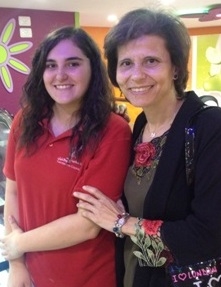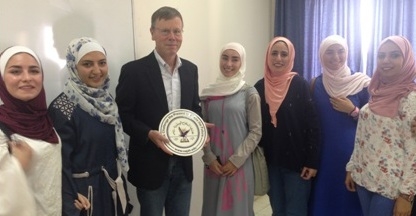The Society of Toxicology (SOT) Global Senior Scholar Exchange Program (GSSEP) supports scientists from developing countries to work with SOT members in academia, government, or industry with the goal to help increase toxicology capacity in developing countries. While the direct benefits are tangible, the indirect benefits of spending time together at each other’s university are equally important in developing capacity and interest in toxicology.
 Dr. Ansam Sawalha, one of the two 2017 GSSEP award recipients, participated in an exchange with Drs. Steven Gilbert, Dave Eaton, and Elaine Faustman of the University of Washington, Seattle, Washington. Dr. Sawalha is a Professor of pharmacology and toxicology at An-Najah National University, Nablus, Palestine, and founding director of the Palestinian Poison Control Center. On the left, Dr. Sawalha (right) is with one of her students.
Dr. Ansam Sawalha, one of the two 2017 GSSEP award recipients, participated in an exchange with Drs. Steven Gilbert, Dave Eaton, and Elaine Faustman of the University of Washington, Seattle, Washington. Dr. Sawalha is a Professor of pharmacology and toxicology at An-Najah National University, Nablus, Palestine, and founding director of the Palestinian Poison Control Center. On the left, Dr. Sawalha (right) is with one of her students.
In January 2017, Dr. Sawalha visited the Department of Environmental and Occupational Health Sciences at the University of Washington where she attended graduate courses, met with faculty and students, and collected syllabi and other information to help build the toxicology program at An-Najah University. She gave a lecture on toxicology in Palestine at a department-wide seminar and also initiated collaboration with Dr. Dave Kalman to evaluate lead levels in various children’s products available in Nablus.
In March, she attended the SOT Annual Meeting and presented an abstract entitled “Analysis of Poisoning in Children Less than 6 Years Old Reported to the Poison Control Center in Palestine.” While in the United States, Dr. Sawalha also visited Dr. Serrine S. Lau, Professor and Dean at Wayne State University, along with other faculty members, including Dr. Terrence Monks. At Wayne State, she attended classes and discussed toxicology curricula and teaching approaches.

Dr. Gilbert receives acknowledgement for his presentations at An-Najah National University, Nablus.
In October 2017, Dr. Steven Gilbert traveled to Nablus where he gave numerous lectures on the health effects of low dose lead exposures and basic toxicology principles. He also gave lectures on the problems related to the drugs used to treat Parkinson’s Disease and Deep Brain Stimulation as an alternative treatment strategy. He met with the Dean and various departmental faculty members to discuss the advantages and challenges of establishing a toxicology program and the possibilities of broader collaboration with the An-Najah School of Public Health as well as the School of Medicine. Faculty members and the students were particularly interested in Dr. Gilbert’s Milestones of Toxicology poster and book, A Small Dose of Toxicology, both of which have been translated into Arabic.
Dr. Sawalha and her students were instrumental in the translation of both the Milestones poster and the book. Drs. Gilbert and Sawalha traveled to Ber Ziet University in Ramallah to meet with Dr. Rita Giacaman and two of her colleagues for discussions on collaboration to evaluate childhood lead exposure in Palestine, including the Gaza Strip. This collaborative project has several advantages. First, it would provide for the development of a map of lead contamination throughout the West Bank and Gaza and allow scarce resources to reduce lead exposure to be deployed rationally. Educational material on the health effects of lead would be developed in Arabic for use in Palestine as well as in other parts of the Arabic speaking work. Second, this project would foster collaboration between Ber Ziet University, An-Najah National University, and the University of Washington. This would further the collaboration between researchers and students from all institutions.
The GSSEP provided an opportunity to develop stronger relationships and build expertise in an Arab-speaking country that has significant environmental and general health problems. The exchange was extremely fruitful. New research opportunities have been explored, along with strategies for developing a toxicology program in Palestine, including a Palestinian society of toxicology. Future student and/or faculty exchanges are a definite possibility. Despite the challenges of coordinating different academic calendars and teaching responsibilities, combating the distractions of jet lag, and addressing the challenges of Israeli travel restrictions for Palestinians and Americans traveling into and out of Palestine, the GSSEP Scholar exchange between Dr. Sawalha and the faculty at the University of Washington was professionally exciting and personally satisfying.
Toxicology has a common global language and many of the problems and challenges of exposure to toxic compounds are found in all areas of the world. The SOT investment in the GSSEP is an important component in building awareness and expertise in developing countries.